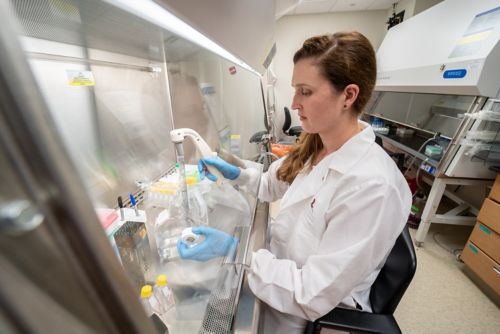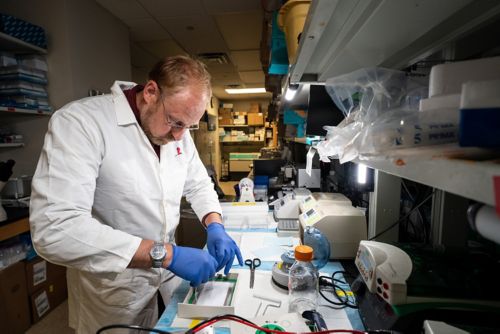St. Jude Family of Websites
Explore our cutting edge research, world-class patient care, career opportunities and more.
St. Jude Children's Research Hospital Home

- Fundraising
St. Jude Family of Websites
Explore our cutting edge research, world-class patient care, career opportunities and more.
St. Jude Children's Research Hospital Home

- Fundraising
John D. Schuetz Lab
Examining transporter proteins and cellular metabolism to discover the mechanisms and pathways that contribute to drug response and resistance
About the Schuetz Lab
ABC transporters are proteins that function as a cell’s motor. They rely on energy provided by the cell’s energy source, ATP, to transport molecules across the cell’s surface. Our laboratory works to uncover how these ABC transporters function within a cell, what pathways they use, and what impact they have on chemotherapeutic drug effectiveness. This knowledge can be leveraged to design better pharmaceuticals that remain in the cell and interrupt certain pathways that may promote cancer cell proliferation and/or development. In the context of childhood acute myeloid leukemia (AML), we examine the metabolic state of cancer cells to discern the true nature of cellular respiration and how this influences drug response.

Our research summary
The core of our research focuses on ABC transporters, how they function, and how their dysfunction within fundamental pathways may contribute to the development of disease and affect resistance and response to therapeutic drugs. We seek to understand the normal function of these transporter proteins and then determine how these functions change under disease conditions. Gaining these insights will help us understand disease etiology and identify effective pharmaceutical treatments that can affect disease development and progression.
Another vital component of our work is the study of a tumor cell’s metabolic state and how this state influences chemotherapeutic drug response. All our research lies at the interface of understanding disease development and the mechanisms that influence treatment response in children with cancer.
Studying ABC transporter proteins
Because of the importance of ABC transporters in the function of a cell, our work examines a few distinct aspects of these protein’s role and impact on disease development and drug resistance.
The promiscuity of these transporters allows them to bind to and move multiple different types of endogenous substances out of a cell, including exogenous agents like drugs. The ability to transport drugs out of a cell led to the classification of these proteins as drug-resistance genes. One of our key interests is understanding how these transporters recognize drugs and the regulation mechanisms that determine how they move drugs across a cell’s membrane. This knowledge can facilitate the development of new therapeutics that impinge upon aspects of the transport process.
Through our collaboration with the Department of Chemical Biology and Therapeutics (CBT), we identified one small molecule, antimycin A, that interacts with the ABCC4 transporter protein to disrupt a key protein interaction that facilitates membrane localization. We additionally identified another small molecule that activates a membrane retrieval process to remove a different/unrelated transporter from the membrane. This interaction negates the transporter’s ability to move therapeutic drugs out of targeted cancer cells. In collaboration with the Department of Tumor Cell Biology, we work to apply this transporter-removal process to preclinical models of medulloblastoma to examine its therapeutic potential.

Another aspect in our study of transporters is their effect on the regulation of the sonic hedgehog pathway—a signaling pathway that goes awry in certain medulloblastomas. In our work, we strive to discover novel elements that regulate this pathway and how disruptions in regulation may lead to disease. The identification of two genes—a novel interacting protein and an orphan ABC transporter—takes our work in an interesting direction, in which we observe that the genetic removal of these two proteins, independently, leads to a disruption in the hedgehog pathway. Our continued work in this area will allow us to understand what these proteins normally do in the sonic hedgehog pathway. Establishing a baseline of normal functionality is a key step as we work to further understand how these proteins impact regulation of the hedgehog pathway and if their disruption or absence plays a role in disease formation.
Metabolic state of tumor cell and influence on chemotherapeutic drug response
In addition to the study of transporters, we concentrate our research efforts on the metabolic state of tumor cells and how it influences chemotherapeutic drug response.
We aim to understand the genetic circuitry within a cell’s metabolism so we can develop effective therapies. Our metabolic research is in the context of acute myeloid leukemia (AML), and we work to understand how AML metabolic activity impacts therapeutic response. Through our examination of AML cell-energy generation (glycolytic versus mitochondrial respiration), we can assess how different AML modes of cellular-energy production impact response to chemotherapeutic drugs. Mechanistic studies reveal that some AML cells die very quickly if placed under artificial conditions in which the cell relies on mitochondria for respiration. But, if the cells are placed under artificial glycolytic conditions, they show no response to therapeutic drugs. The ability to discern the energy-use pathways in AML can become an important aspect of therapy as we continue to search for more effective treatments for children with AML.
The work in our laboratory is marked by selfless cooperation and our desire to operate for the greater good in support of the St. Jude mission. In all our efforts, we work to create knowledge and develop concepts that could improve therapeutic understanding and outcomes in children with cancer.
Contact us
John D. Schuetz, PhD, FASPET
Member, St. Jude Faculty
Department of Pharmacy and Pharmaceutical Sciences
MS 313, Room I5103A
St. Jude Children's Research Hospital

Memphis, TN, 38105-3678 USA GET DIRECTIONS